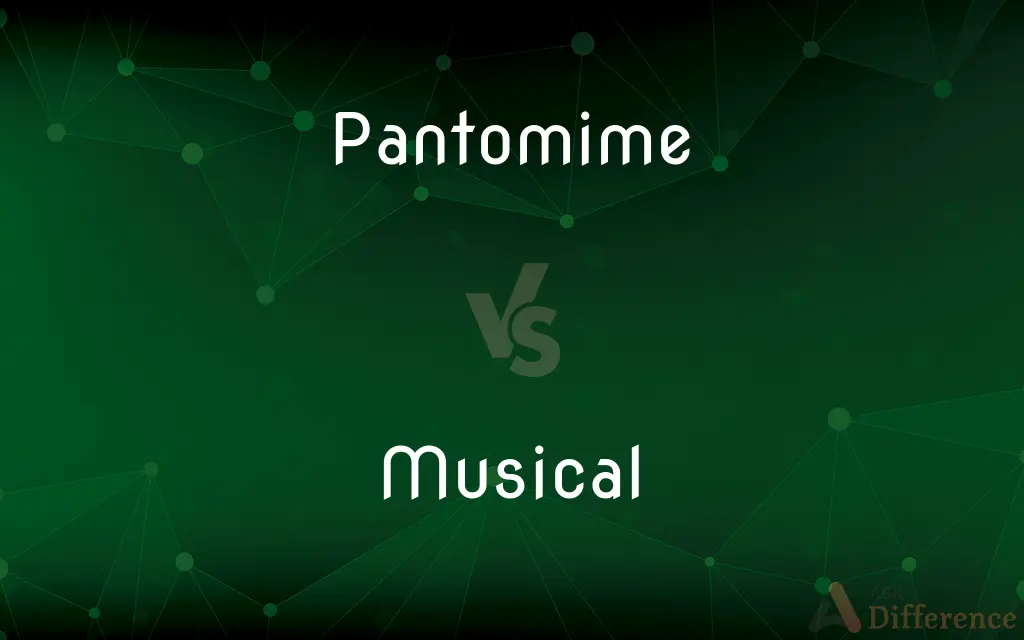Pantomime vs. Musical — What's the Difference?
By Tayyaba Rehman & Fiza Rafique — Updated on March 13, 2024
Pantomime focuses on silent art, using mime to tell a story, often with exaggerated characters, while musicals combine songs, spoken dialogue, acting, and dance.

Difference Between Pantomime and Musical
Table of Contents
ADVERTISEMENT
Key Differences
Pantomime emphasizes storytelling through body language and facial expressions, often silent and exaggerated for comedic or dramatic effect. It has deep roots in theatrical history, originating from ancient mime practices. Musicals, on the other hand, are a blend of songs, spoken dialogue, acting, and dance. They tell their stories through music and lyrics, with characters and plots developed through song as much as dialogue.
While pantomimes primarily engage the audience through visual gags, slapstick comedy, and mime, musicals rely on the emotional and narrative power of music and lyrics. The musical score and songs in a musical are often as important as the script, driving the story forward and highlighting character development.
Pantomimes traditionally involve audience participation, with call-and-response, booing the villain, and cheering the hero as common elements. This interactive aspect is a key feature, making it a unique and engaging form of entertainment for families and children. Musicals, while they can involve the audience emotionally, typically do not include direct interaction.
The settings and themes of pantomimes are usually whimsical, with magical elements and broadly drawn characters, making them accessible and entertaining for children. Musicals, however, cover a broader range of themes and settings, from historical narratives to contemporary issues, appealing to a wide age range and interests.
Comparison Chart
Primary Elements
Mime, body language
Songs, dialogue, acting, dance
ADVERTISEMENT
Audience
Families, children
Wide range, varies by musical
Interaction
High (audience participation)
Low (emotional engagement)
Themes
Whimsical, fairy tales
Varied, from light to serious
Historical Roots
Ancient mime practices
19th century theater
Compare with Definitions
Pantomime
A form of theatrical performance combining mime, body language, and exaggerated expressions.
The pantomime at the local theater had the audience in stitches with its silent but hilarious storyline.
Musical
A stage, television or film genre combining songs, spoken dialogue, acting, and dance.
The musical Hamilton blends hip-hop with history, captivating audiences.
Pantomime
Often interactive, encouraging audience participation.
During the pantomime, kids eagerly shouted advice to the heroes.
Musical
Can range from comedic to deeply dramatic.
The musical The Book of Mormon uses humor to explore cultural themes, whereas Phantom of the Opera delves into romance and mystery.
Pantomime
Features stock characters like the Dame, played by a man in drag.
The Dame's extravagant costumes are always a highlight of any pantomime.
Musical
Appeals to a broad audience.
The universal themes and varied music of musicals attract diverse audiences to theaters worldwide.
Pantomime
Relies on visual comedy and slapstick.
The pantomime's slapstick comedy had even the adults laughing.
Musical
Tells stories through music and lyrics.
In the musical Les Misérables, each character's plight and passion are expressed through song.
Pantomime
Traditionally performed during the Christmas season in the UK.
Our annual tradition includes watching a pantomime on Christmas Eve.
Musical
Often features a complex musical score.
The intricate score of the musical Wicked includes songs that have become Broadway anthems.
Pantomime
Representing only in mute actions; pantomimic; as, a pantomime dance.
Musical
Of, relating to, or capable of producing music
A musical instrument.
Pantomime
Pantomime (; informally panto) is a type of musical comedy stage production designed for family entertainment. It was developed in England and is performed throughout the United Kingdom, Ireland and (to a lesser extent) in other English-speaking countries, especially during the Christmas and New Year season.
Musical
Characteristic of or resembling music; melodious
A musical speaking voice.
Pantomime
A theatrical entertainment, mainly for children, which involves music, topical jokes, and slapstick comedy and is based on a fairy tale or nursery story, usually produced around Christmas
A pantomime villain
He is currently appearing in pantomime in Manchester
Musical
Set to or accompanied by music
A musical revue.
Pantomime
A dramatic entertainment, originating in Roman mime, in which performers express meaning through gestures accompanied by music.
Musical
Devoted to or skilled in music.
Pantomime
An absurdly exaggerated piece of behaviour
He made a pantomime of checking his watch
Musical
A play or movie that contains musical numbers.
Pantomime
Express or represent by exaggerated mime
They pantomimed picking up dropped food
Musical
A musical comedy.
Pantomime
Communication by means of gesture and facial expression
Some tourists make themselves understood abroad by pantomime.
Musical
(Archaic) A musicale.
Pantomime
The telling of a story without words, by means of bodily movements, gestures, and facial expressions.
Musical
Of, belonging or relating to music, or to its performance or notation.
Musical proportion; musical instruments
Pantomime
A play, dance, or other theatrical performance characterized by such wordless storytelling.
Musical
Pleasing to the ear; sounding agreeably; having the qualities of music; melodious; harmonious.
She had a musical voice.
Pantomime
An ancient Roman theatrical performance in which one actor played all the parts by means of gesture and movement, accompanied by a narrative chorus.
Musical
Fond of music; discriminating with regard to music; gifted or skilled in music.
The child is musical; having a musical ear
Pantomime
A player in such a performance.
Musical
Pertaining to a class of games in which players move while music plays, but have to take a fixed position when it stops; by extension, any situation where people repeatedly change positions.
Pantomime
A traditional British Christmas entertainment for children, usually based on nursery tales and featuring stock characters in costume who sing, dance, and perform skits.
Musical
A stage performance, show or film that involves singing, dancing and musical numbers performed by the cast as well as acting.
Pantomime
To represent or express by pantomime
Pantomime a story on the stage.
Pantomimed "baby" by cradling an imaginary infant.
Musical
A meeting or a party for a musical entertainment; a musicale.
Pantomime
To express oneself in pantomime.
Musical
Of or pertaining to music; having the qualities of music; or the power of producing music; devoted to music; melodious; harmonious; as, musical proportion; a musical voice; musical instruments; a musical sentence; musical persons.
Pantomime
A Classical comic actor, especially one who works mainly through gesture and mime.
Musical
Music.
To fetch home May with their musical.
Pantomime
(historical) The drama in ancient Greece and Rome featuring such performers; or (later) any of various kinds of performance modelled on such work.
Musical
A social entertainment of which music is the leading feature; a musical party.
Pantomime
(UK) A traditional theatrical entertainment, originally based on the commedia dell'arte, but later aimed mostly at children and involving physical comedy, topical jokes, call and response, and fairy-tale plots.
Musical
A drama in which music and song are prominent features; a musical drama or musical play; as, Oklahoma! was a breakthrough in the form and popularity of the musical.
Pantomime
Gesturing without speaking; dumb-show, mime.
Musical
A play or film whose action and dialogue is interspersed with singing and dancing
Pantomime
(transitive) To make (a gesture) without speaking.
I pantomimed steering a car; he understood, and tossed the keys to me.
Musical
Characterized by or capable of producing music;
A musical evening
Musical instruments
Pantomime
(transitive) To entertain others by silent gestures or actions. en
Musical
Talented in or devoted to music;
Comes from a very musical family
Pantomime
A universal mimic; an actor who assumes many parts; also, any actor.
Musical
Characteristic of or resembling or accompanied by music;
A musical speaking voice
A musical comedy
Pantomime
One who acts his part by gesticulation or dumb show only, without speaking; a pantomimist; a mime.
[He] saw a pantomime perform so well that he could follow the performance from the action alone.
Musical
Containing or constituting or characterized by pleasing melody;
The melodious song of a meadowlark
Pantomime
A dramatic representation by actors who use only dumb show; a depiction of an event, narrative, or situation using only gestures and bodily movements, without speaking; hence, dumb show, generally.
Pantomime
A dramatic and spectacular entertainment of which dumb acting as well as burlesque dialogue, music, and dancing by Clown, Harlequin, etc., are features.
Pantomime
A performance using gestures and body movements without words
Pantomime
Act out without words but with gestures and bodily movements only;
The acting students mimed eating an apple
Common Curiosities
What is pantomime?
Pantomime is a theatrical performance that emphasizes mime, using body language and facial expressions for storytelling, often with audience participation.
What distinguishes a musical from other forms of theater?
Musicals combine songs, spoken dialogue, acting, and dance to tell a story, with music playing a central role in narrative and character development.
How do musicals handle serious themes?
Musicals often use powerful lyrics and emotive music to explore serious themes, allowing for deep emotional connection and reflection.
Why are pantomimes popular during Christmas in the UK?
Pantomimes have become a festive tradition, offering family-friendly entertainment that celebrates whimsical storytelling and humor during the holiday season.
Can adults enjoy pantomimes?
Absolutely, pantomimes are designed to entertain audiences of all ages with humor, satire, and engaging performances that appeal to both children and adults.
What makes a musical successful?
A successful musical combines a compelling story, memorable music, engaging performances, and production quality that resonates with audiences.
How do pantomimes engage their audience?
Pantomimes involve the audience through interactive elements like call-and-response, encouraging them to boo the villain and cheer for the hero.
Do all musicals include dance?
While most musicals incorporate dance to some extent, the prominence of dance varies widely among productions, with some focusing more on songs and dialogue.
Can musicals be based on true stories?
Yes, many musicals are based on true events or historical figures, blending factual narratives with artistic interpretation through music and lyrics.
What role do songs play in a musical?
Songs in musicals are crucial for advancing the plot, developing characters, and expressing emotions that dialogue alone might not convey.
How do musicals differ in style?
Musical styles can range from classical to modern, including rock, pop, and hip-hop, reflecting the diversity of the genre and its adaptability to different stories and themes.
Are pantomimes only performed in the UK?
While pantomimes are a significant part of British culture, particularly during Christmas, similar forms of mime and interactive theater exist worldwide.
Are there modern pantomimes?
Yes, modern pantomimes continue to evolve, incorporating contemporary themes and music while maintaining traditional elements like audience interaction.
Do pantomimes use modern music?
Modern pantomimes often include contemporary music and pop songs, adapted to fit the whimsical and interactive nature of the performance.
How important is the script in a musical?
The script is essential in a musical, providing the framework for the story, character development, and integrating the music and lyrics seamlessly into the narrative.
Share Your Discovery

Previous Comparison
Wardrobe vs. Costume
Next Comparison
Lobotomy vs. LobectomyAuthor Spotlight
Written by
Tayyaba RehmanTayyaba Rehman is a distinguished writer, currently serving as a primary contributor to askdifference.com. As a researcher in semantics and etymology, Tayyaba's passion for the complexity of languages and their distinctions has found a perfect home on the platform. Tayyaba delves into the intricacies of language, distinguishing between commonly confused words and phrases, thereby providing clarity for readers worldwide.
Co-written by
Fiza RafiqueFiza Rafique is a skilled content writer at AskDifference.com, where she meticulously refines and enhances written pieces. Drawing from her vast editorial expertise, Fiza ensures clarity, accuracy, and precision in every article. Passionate about language, she continually seeks to elevate the quality of content for readers worldwide.
















































